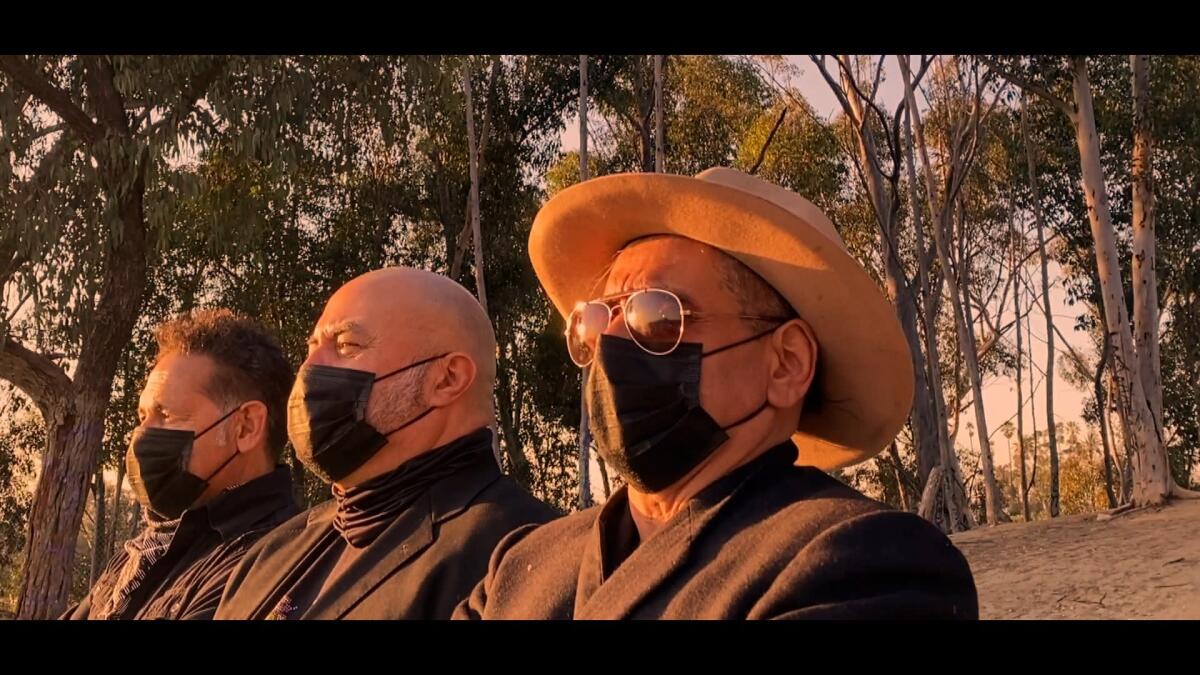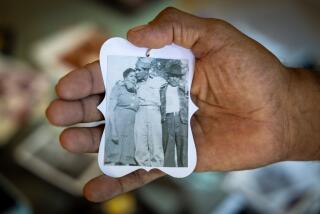Review: Culture Clash revives its visually haunting ‘Chavez Ravine’ for the digital stage

- Share via
As theaters open their doors after a long suspension, digital productions may seem less of a draw. But Angelenos might find a project that Culture Clash was working on during the pandemic to be of special interest.
“Chavez Ravine: In 9 Innings,” a cinematic re-imagining of the troupe’s play about a painful chapter in Los Angeles history, is now available on Center Theatre Group’s Digital Stage. Broken up into nine bite-size installments, this new incarnation of the work (streaming through Dec. 6) has the feeling of a multimedia mixtape documenting a battle royale in the city’s haunted past.
Culture Clash’s Richard Montoya, Ric Salinas and Herbert Siguenza, the writers and performers of the piece, deploy their vaudevillian skills strategically in a work of serious intent: “Chavez Ravine” tells the story of the predominantly Mexican American hillside neighborhoods of La Loma, Palo Verde and Bishop north of downtown Los Angeles that were bulldozed in the name of urban renewal in the 1950s.
The government’s acquisition of land, sanctioned by eminent domain and sanctified by the promise of public housing, destroyed a group of close-knit communities that had established themselves in the area. The utopian vision that persuaded many families to sell their homes was undermined by corruption, redbaiting and greed.
The land, obtained by force when persuasion fell short, didn’t provide displaced residents with better living conditions. Instead, it was dangled to lure the Brooklyn Dodgers to L.A. Opened in 1962, Dodger Stadium occupies the site where poor and marginalized Mexican Americans had laid down generational roots.
This baseball connection inspires Culture Clash’s nine-inning structure. Admittedly, the fractured digital setup can make this version of “Chavez Ravine” seem diffuse and disorderly. But the vignettes are brief, and each episode establishes the context of the play in so much alluring archival footage and enriching visual detail that something is gained in the unwieldiness.
The cinematic swirl brings back to life a vintage Los Angeles, when the roads weren’t completely clogged with traffic, the hills were seasonally lush and California dreaming was in full effect. Chavez Ravine, a sanctuary for those left out of the economic boom, appears in flashes as an impoverished yet communally rich Eden.
Amid all the hypnotic imagery, the dramatic elements occasionally seem pedestrian. But stepping out of the frame to playfully riff on a wayward performance is a Culture Clash specialty. When Montoya goes up on his lines, he uses the moment to explain why he’s nervous about portraying Frank Wilkinson, the idealistic housing authority official whose determination to provide desirable public housing made him a target of a McCarthy-era witch hunt.
I didn’t especially mind that a fake mustache looks like it’s about to fall off or that scenes filmed in the Music Center’s parking structure don’t hide that they were shot on an iPhone. Culture Clash intends for us to appreciate this digital offering as a work made during the pandemic in a freewheeling communal spirit.
Time is taken to acknowledge the late Gordon Davidson, Center Theatre Group’s founding father, for giving the company the idea of theatrically investigating the Chavez Ravine story. This production is as much a love letter to Center Theatre Group, which has supported this work through many iterations, as it is a history lesson for our all-too-forgetful city.
Nods to the company’s comic tradition are built into the play. Montoya lets loose in drag as a moonshine-swigging, cigarette-smoking abuela. Later, Siguenza and Salinas winningly reprise a portion of their Abbott and Costello “Who’s on First” routine in English and Spanish.
The inclusion of Maria (Gabriela Maldonado), a daughter of Chavez Ravine, personalizes this historical tale. When she dances with her older self, the Maria who has become a professor (Sabina Zúñiga Varela), the city’s past and present share a poignant embrace.
“Chavez Ravine,” which had its premiere at the Mark Taper Forum in 2003, is a living project for Culture Clash. When I first saw the play, in a revised version in 2015 directed by Lisa Peterson and featuring music of the Rodarte Brothers, I admired the production more than the playwriting.
In this new digital version, co-curated by Culture Clash and Peterson, the playwriting is sampled in a storytelling mode described as “selections and allegories.” The emphasis is on seeing what was lost. Musicians Vaneza Calderon, Randy Rodarte and Scott Rodarte lyrically assist in this retrospective conjuring act.
Ultimately, the production has the effect of a palimpsest, where forgotten layers of Los Angeles keep peeking through. “Chavez Ravine” is a ghost story that exhumes what injustice tried to bury.
'Chavez Ravine: In 9 Innings'
Where: Via Center Theatre Group’s Digital Stage, ctgla.org/ChavezRavineIn9Innings
When: Streaming through Dec. 6
Tickets: $20
Running time: 1 hour, 47 minutes, presented in nine 10- to 15-minute episodes (“innings”)
More to Read
The biggest entertainment stories
Get our big stories about Hollywood, film, television, music, arts, culture and more right in your inbox as soon as they publish.
You may occasionally receive promotional content from the Los Angeles Times.












